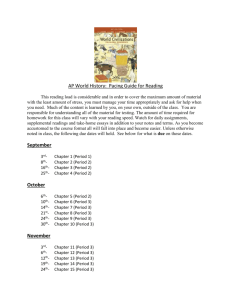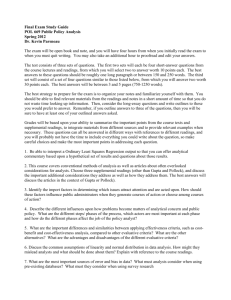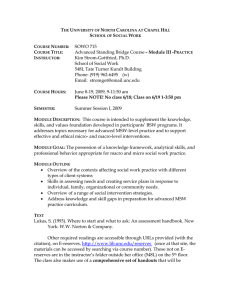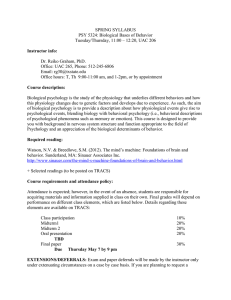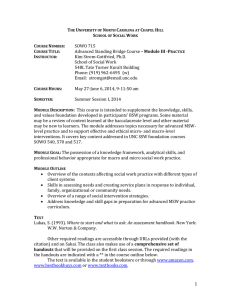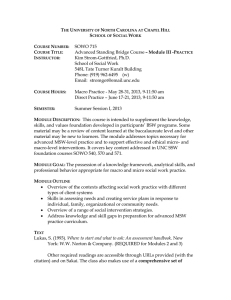Start early to finish strong PowerPoint
advertisement
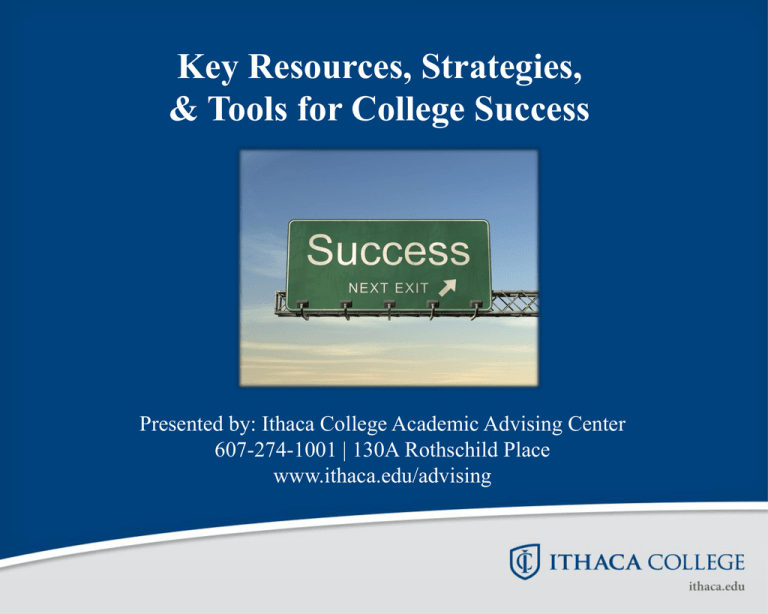
Key Resources, Strategies, & Tools for College Success Presented by: Ithaca College Academic Advising Center 607-274-1001 | 130A Rothschild Place www.ithaca.edu/advising Academic Advising Center Appointment & Drop-in Hours Monday – Thursday | 9:00 am – 4:00 pm Friday | 10:00 am – 4:00 pm Comprehensive Student Success Model V.A.R.K. Time Management Exam Prep CollegeLevel Reading Study Strategies What’s Your Learning Style? V.A.R.K. • Visual–concept maps, diagrams, charts, etc. • Auditory–read out loud, hearing and listening • Read/write–taking notes, make lists, re-write notes • Kinesthetic–act of writing, moving while reading, coloring/highlighting V.A.R.K. Self - Assessment Take a few moments and complete the VARK learning styles inventory questionnaire! • How do you learn best? • Do you think this self-assessment accurately reflects your learning style preferences? • Why is this exercise and information applicable for this workshop? Hitting the Books College-Level Reading • Make a connection between the readings and class content. • Avoid reading a large number of pages at once. • If you get to the end of a paragraph or page and can’t remember what you read – STOP! • Read with purpose – jot down main ideas and highlight as needed. Types of Reading • Textbooks • Preview chapters and examine chapter structure • Read, summarize, and highlight sections as needed • Recommended/Supplemental Readings • Use supplemental materials to help you understand complex ideas • Journal/Research Articles • Introduction and conclusion provide valuable information • Middle section usually includes methodology and statistical analysis • Blogs/posts/other web-based readings • What are reliable sources? Study Strategies Study Strategies • Frequent and brief review of notes and Power Points • Break down reading into smaller segments • Look for purposeful connections between assignments/readings and course content Study Strategies • Understand that different disciplines require different ways of studying • Science, Math, & Computer Science: ∙ formulas, concepts, connection, problem sets, & practice • Humanities & Social Sciences: ∙ concepts, theories, trends, analyzing, large amount of reading, focus on papers Tips for Exam Prep Tip #1 | Read the Syllabus • What is the exam going to look like? • What information will it include? • Will it be multiple choice/essay/short answer? • Will it look like other exams you have taken in the course? Tip #2 | Predict Test Questions • Devise questions from the text, lectures, handouts, and materials used in class. • Be aware of the following clues: • • • • Points that the professor repeats or emphasizes in class Questions asked by the professor in class Questions from quizzes, homework, handouts Student learning outcomes from syllabus Tip #3 | Create Good Review Tools • Review notes and extract main ideas and important concepts: • • • • • • Use Flash Cards Make a Chapter Outline Create a Study Checklist Create Mnemonics Create Mind Maps Study in a Group How do I fit it all in? What are my mandatory time draws? • Class times • Other mandatory attendance programs: • work, tutor programs, extra help sessions, etc. • Meals • Clubs • Anything that requires some of your time: • Volunteer work, organizations, etc. • Sleep Where are my free blocks of time? • Identify time slots that are not taken by mandatory time draws. • Indicate study time/free time. • Be sure to allow 3 hours per credit hour for each class!! • Ex. 15 credits of class time indicates 45 hours of study time per week. Does that seem possible? Tips for Successful Time Management • Plan each day • Prioritize your tasks • Say no to nonessential tasks. • Take the time you need to do a quality job • Break large, timeconsuming tasks into smaller tasks • Evaluate how you're spending your time • Limit distractions • Get plenty of sleep, eat a healthy diet and exercise regularly • Take a break when needed Questions?


